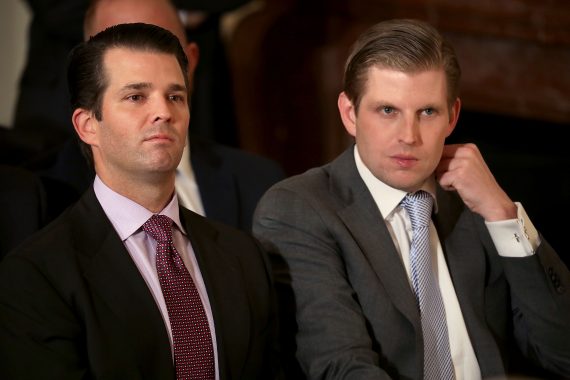During a heated press conference right before the inauguration, then President-elect Trump said he was stepping away from his sprawling business empire through a trust agreement with his two adult sons and a longtime company executive, Allen Weisselberg.
But documents recently obtained by ProPublica showed that only Donald Jr. and Weisselberg were named trustees. Trump’s younger son, Eric, was named chairman of the advisory board that’s supposed to work with the trust. And though both sons claim to have equal control over the Trump Organization, corporate lawyers said the structure in place provides little clarity about who’s in charge of the assets held by the trust.
“We act as a family unit and we have incredible loyalty — and everybody works incredibly hard and everybody is incredibly good at what they do,” Eric told the New York Post earlier this month, sounding more than a little like his father. According to a New York Times profile Feb. 12, Eric is the sole member of what he described to the paper as an “advisory council.” A representative for the Trump Organization told The Real Deal that “trustees and the Advisory Board must act and opine on every major action and business decision. Accordingly Eric Trump, Donald Trump Jr. and Allen Weisselberg are the sole decision makers for the organization.”
But outside experts weren’t so sure. “What we have here is the assertion that there is an advisory board, but advisory boards tend to give advice, rather than make decisions,” said Kathleen Clark, a professor of ethics law at Washington University.
[vision_pullquote style=”3″ align=”right”] “It’s either careless lawyering, or really careful lawyering. I’m not sure which that is.” [/vision_pullquote]
Under typical trust agreements, only trustees get to call the shots on what happens to those kinds of assets, attorneys said. The Donald J. Trump Revocable Trust has control over sizable assets such as Trump Tower and Trump International Hotel and Tower. The trustees would make major decisions on these assets, including on new tenant leases, asset refinancings and sales.
“Sometimes there’s an investment advisory committee who advises the trustees, but the trustees would be the ones with ultimate authority in terms of how to act,” said Barbara Lawrence, chair of the trust and estate department at Herrick Feinstein.
Clark said the the Trump Organization’s explanation of the advisory board seemed to contradict itself, because while it asserts that Eric is one of the sole decision makers, the verb choices for the advisory board are “act” and “opine,” which do not clearly indicate decision-making ability. “It’s a little incongruent,” she said.
It’s certainly possible that though Eric may not have direct oversight over the president’s personal assets, he may still be in a position of influence. Trust structures allowing outside boards or individuals to have real power over trust decisions are not uncommon, attorneys said.
There are many ways to set up checks and balances on trustees, said David Herzig, a law professor at Valparaiso University. The trust agreement could allow an advisory board to provide a required vote that would allow the trustees to do business on behalf of the trust, or even give the advisory board oversight over a specified set of assets. So-called directed trusts are designed to allow non-trustees to make key decisions in the trust’s execution, he said.
A source close to the Trump Organization said the structure was “intended for checks and balances and yes a vote of everyone is required for such actions.”
Herzig, the law professor, said “the problem is we don’t have a copy of the trust agreement.” The Trump Organization did not provide any documentation showing the advisory board’s role in the running of the trust.
“You don’t really know what the trust agreement says and who it empowers,” he added.
“That provision could be written any way that a creative lawyer would want to write it,” said Fred Tansill, a Virginia-based estate planning lawyer. “It’s possible that there is a highly, highly unusual, highly customized, trust protector/trust advisor provision that gives him [Eric] kind of standalone, or co-equal authority from which he can’t be discharged by his brother and the CFO.”
But Lawrence did point to an important line in the trust certification which states “there are no facts which constitute conditions precedent to acts by the Trustee.” This “conditions precedent” language usually indicates that trustees are the only individuals with real authority over the trust’s assets, she said, and there are no other conditions that change or complicate that basic fact.
“To me it’s unclear how this advisory board fits in,” Lawrence said.
A line appearing earlier in the document, however, could allow for some wiggle room, she said. It states the trust is also subject to certain “restrictions and requirements,” a phrase that could be interpreted in many ways.
“One indicates one thing, one indicates the other…it’s typical that they provide themselves a little wiggle room” Tansill said. “It’s either careless lawyering, or really careful lawyering. I’m not sure which that is.”
But all of this might be meaningless anyway. The organization of a revocable trust can be changed up as Trump pleases. “Trump can change who the trustees are at any time,” Lawrence said.
